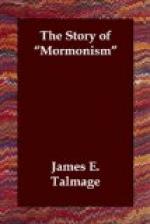During his earthly ministry Christ called and ordained men to offices in the Church. We have a record of apostles particularly, numbering twelve, and beside these, seventy others who were commissioned to preach, teach, baptize and perform other ordinances of the Church. After our Lord’s departure, we read of the apostles continuing their labors in the light of continued revelation. By this sure guide they selected and set apart those who were to officiate in the Church. By revelation, Peter was directed to carry the gospel to the Gentiles; which expansion of the work was inaugurated by the conversion of the devout Cornelius and his household. By revelation, Saul of Tarsus became Paul the Apostle, a valiant defender of the faith. Holy men of old spake and wrote as they were moved upon by the Holy Ghost and depended not upon the precedents of ancient history nor entirely upon the law then already written. They operated under the conviction that the living Church must be in communication with its living Head; and that the work of God, while it was to be wrought out through the instrumentality of man, was to be directed by him whose work it was, and is.
“Mormonism” claims the same necessity to exist today. It holds that it is no more nearly possible now than it was in the days of the ancient prophets or in the apostolic age for the Church of Christ to exist without direct and continuous revelation from God. This necessitates the existence and authorized ministrations of prophets, apostles, high priests, seventies, elders, bishops, priests, teachers and deacons, now as anciently—not men selected by men without authority, clothed by human ceremonial alone, nor men with the empty names of office, but men who bear the title because they possess the authority, having been called of God.
Is it unreasonable, is it unphilosophical, thus to look for additional light and knowledge? Shall religion be the one department of human thought and effort in which progression is impossible? What would we say of the chemist, the astronomer, the physicist, or the geologist, who would proclaim that no further discovery or revelation of scientific truth is possible, or who would declare that the only occupation open to students of science is to con the books of by-gone times and to apply the principles long ago made known, since none others shall ever be discovered?
The chief motive impelling to research and investigation is the conviction that to knowledge and wisdom there is no end. “Mormonism” affirms that all wisdom is of God, that the halo of his glory is intelligence, and that man has not yet learned all there is to learn of him and his ways. We hold that the doctrine of continuous revelation from God is not less philosophical and scientific than scriptural.




